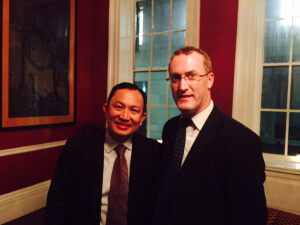The yuan is now a reserve currency. What does this mean for retail forex? We investigate from inside China
As reported by FinanceFeeds yesterday, the International Monetary Fund (IMF) has formally accepted the Chinese yuan renminbi into the Special Drawing Rights (SDR) basket of reserve currencies. This decision, following an alignment with the IMF’s requirements by Chinese officials, marks the opening of a potential for a monumental shift in the entire structure of the […]

As reported by FinanceFeeds yesterday, the International Monetary Fund (IMF) has formally accepted the Chinese yuan renminbi into the Special Drawing Rights (SDR) basket of reserve currencies.
This decision, following an alignment with the IMF’s requirements by Chinese officials, marks the opening of a potential for a monumental shift in the entire structure of the forex industry, from the interbank sector which will now be able to conduct legitimate conversions between major banking institutions across the world, and on the retail side the chance to include the yuan as a major on trading platforms.
Following the inclusion of the yuan into the basket of reserve currencies, the IMF’s Managing Director Christine Lagarde stated publicly in Washington DC that this is a
“recognition of the progress that the Chinese authorities have made in the past years in reforming China’s monetary and financial systems. The continuation and deepening of these efforts will bring about a more robust international monetary and financial system, which in turn will support the growth and stability of China and the global economy.”
The currency will be included in the existing reserve basket of SDR currencies, which currently is apportioned as follows: U.S. dollar ($) 41.9%, euro (€) 37.4%, pound sterling (£) 11.3%, and Japanese yen (¥) 9.4%.
The IB network will remain exactly as it is
FinanceFeeds conducted extensive research among Chinese traders, as well as portfolio managers who trade customer accounts on behalf of retail FX investors, and IBs which refer direct business in order to understand how the inclusion of the yuan may influence their business or open up the global financial markets to customers.
The unanimous view from within is that it will make absolutely no difference whatsoever, as the interest of Chinese investors and traders is not the access to global reserve currencies in order that they may trade them against the yuan, but rather the operation of the actual trading environment and commercial structure of a brokerage which an IB chooses to place client business with.
Speaking to an FX portfolio management company in Zhengzhou which trades over 90,000 lots per month, FinanceFeeds CEO Andrew Saks-McLeod was told that investors are not concerned with which currencies are traded, or how they are traded, but are interested in liquid assets that they can monetize quickly (not Chinese stocks and shares which are controlled and influenced by government intervention, state company ownership and state stock exchange ownership), and look for Australian or British companies that have been established for a long period of time, and are preferably publicly listed.

Because of the closed nature of Chinese business, the government’s non-recognition of foreign entities, lack of recourse, and internet restrictions, combined with the general preference for managed portfolios or automated trading via EAs among Chinese investors, these credentials are of infinitely greater importance than whether the local currency is exchangeable worldwide without restriction.
A long time coming, but still not there
It is quite clear that the Communist Party of China will not renounce control of its entire domestic markets, and will remain fully in control of all industry, capital inflows and outflows, and hold shares in all companies.

It is not in China’s interests to relinquish any control over any aspect of its commercial ecosystem. The country has vast buying power and a clever system in which the government makes its revenue from the share of every company in the land that it holds, whilst empowering businesses by providing massive resources toward driving them forward and at the same time restricting foreign enterprise which means that Chinese entities must work with overseas firms, protecting the entire nation from being swamped by multinationals and stopping an outflow of Chinese companies.
FinanceFeeds met recently with the CEO of a global FX service provider who owns shares in several FX brokeages internationally and has worked closely with the Chinese government.
When asked by FinanceFeeds whether China will establish its own interbank FX market which could usurp that of Hong Kong or Singapore, he said “Whilst this is a step in the right direction, it is not there yet.”
“Since the success of the Asian Infrastructure Investment Bank, the IMF is now kowtowing to China” he continued.
“As far as actually taking the yuan onto the world stage, the three years of planning and government-level discussions that it took to get this far are a very good start and there have been tremendous technical advances, but there is still a long way to go” he said.
Never mind the global markets, look locally!
….and what exactly is local? China is a vast, economic powerhouse in which the entire nation is completely standardized, with a highly educated population – and talking of population, China is home to 1.35 billion people – and business giants across the entire nation that make everything for the entire world. Therefore, international commercial trade, which leads to the need for interbank FX transactions, is often conducted within China an exports are handled by government agencies.
Bearing this in mind, the central government-level handling of transfers from yuan into other currencies – the fourth highest denomination of FX transfers in the world – is irrelevant not only to most investors and traders, but also to China’s banks.
For example, in a meeting with Advanced Markets in Boston, Massachussets last week, FinanceFeeds discussed with senior executives at the wholesale provider whether partnering with exchanges and banks in China is the way of the future.

Advanced Markets is one company that is looking closely at fostering relationships with exchanges and institutions in China in order to provide a direct trading environment for Chinese customers rather than the ubiquitous method of IB transactions. This method still does not have any bearing on the yuan.
For example, if a prime brokerage or wholesale firm from the West partnered with a Chinese exchange or bank, the instruments offered would likely be Western currencies, and Western commodities, on a futures (exchange) or spot (OTC) basis.
In New York last week, Phillip Capital CEO Teyu Che Chern explained to Andrew Saks-McLeod that its branching into the US retail market for exchange-traded futures and ICE’s foray into Phillip Capital’s native Singapore was more to do with facilitating global order flow rather than any concentration on China’s mainland currency.
Business as usual, then. Unless you are a heavy manufacturing company, motor manufacturer or electronic goods exporter.
For retail traders, as far as China is concerned, it’s a case of meet the new boss, same as the old boss.
Featured photograph: Shanghai’s modern Puxi district. Photography by Andrew Saks-McLeod









